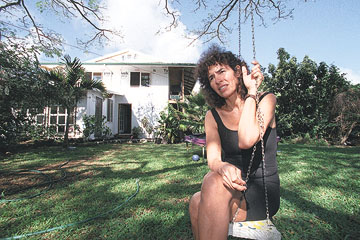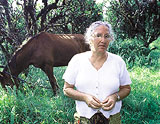"Marijuana is illegal, but I don't think the solution to the problem is working because it affects people who are not even involved. I'm victimized, and I don't grow marijuana." Big Island resident Rene Siracusa, whose animals have died when panicked by eradication helicopters
"My personal concern is that children can find it. Then again, some children who find it will have discovered a great way to buy a new surfboard." Long-time grower, when asked how he feels about cultivating marijuana |
 Judith Mura's daughter gets nightmares when eradication helicopters fly over their house in Puna Palisades, causing it to rumble and shake. "How can the United States of America declare war on its own citizens?" Mura asked.
The politics of pot in Hawaii play a role from the State Capitol — where the House and Senate approved bills this session to legalize marijuana for medical purposes — to the Hilo government center, where hemp and legalization advocates failed last year to recall the mayor and six council members. Jonathan Adler is pushing the legalization of medical marijuana in his campaign for Big Island mayor. He grows marijuana around his home in Puna’s Hawaiian Paradise Park and was indicted last year on felony drug charges. Adler says he has a prescription to smoke marijuana for his chronic asthma. He dreams of the day when he can offer pakalolo openly to ease patients’ suffering. He can’t wait to go to trial so he can argue his right to smoke and grow marijuana. Each year on the Big Island, the County Council considers whether to accept federal marijuana eradication money. Each year, a parade of hemp advocates, medical marijuana practitioners and legalization proponents fills the council chamber.
Dissident council members are led by Curtis Tyler, a Republican, small businessman and former Navy lieutenant who has become an unlikely hero to the pro-marijuana forces. Tyler doesn’t support legalizing marijuana. He’s simply against what he calls misguided government policies. A Big Island audit last year reviewed the $353,294 the county received in federal money for marijuana eradication in 1997-98. The money helped pay for 100 arrests for marijuana cultivation and the seizure of 331,109 plants. But the audit didn’t answer Tyler’s more fundamental questions. “Why are we doing this, and what are we accomplishing?” Tyler asked. “My assessment is we’re winning a lot of battles, but we’re not winning the war. My bigger question is: ‘What is the war we’re fighting?’ ” If the goal is to win a war against marijuana, Tyler said, perhaps more money needs to go to prevention and treatment. Otherwise, a law enforcement eradication program is “like putting a Band-Aid on a cancerous mole. This is indicative of so much of what government does. We address the symptoms and not the cure.” Paula Helfrich, president of the Hawaii Island Economic Development Board, knows that marijuana continues to pump money into the Big Island economy. During the 1980s, it paid for new cars and trucks, founded businesses and bought everyday things, such as groceries. But she doesn’t want to hear that marijuana is good for the Big Island. Its reputation as ground zero of a marijuana war hurts the island’s hopes of attracting new agriculture to replace the dead sugar industry, Helfrich said. “Having the majority of the marijuana crop here has been the single biggest detriment to ... viable, legal, agricultural alternatives,” she said. Coffee, papaya and forestry representatives have looked at investing in the Big Island, she said, but they don’t like the “perception that we’re the pot capital.” “They’re either put off by the perception or the reality,” she said. “And the reality is that marijuana growers still sneak onto other peoples’ property and grow illegally.”
|
|||||||||||||||||||||||||||||||||||||||||||||||
